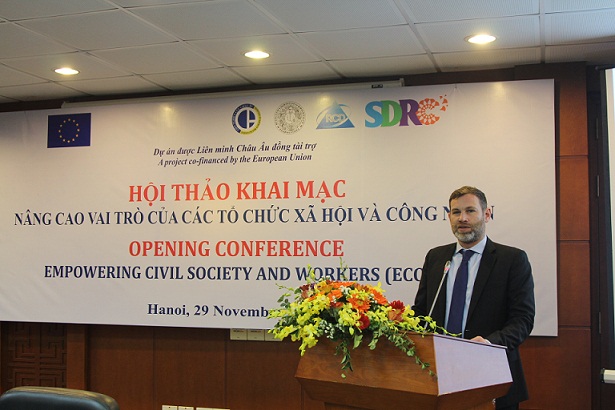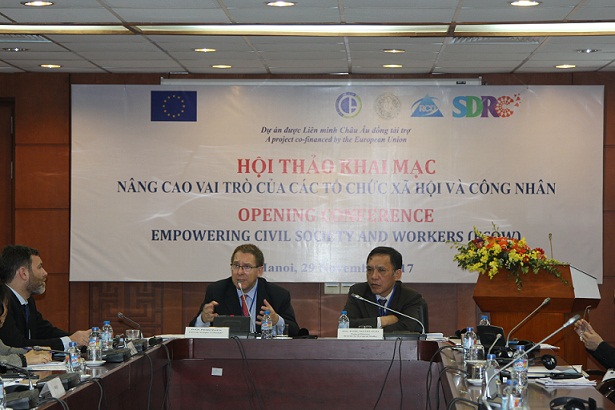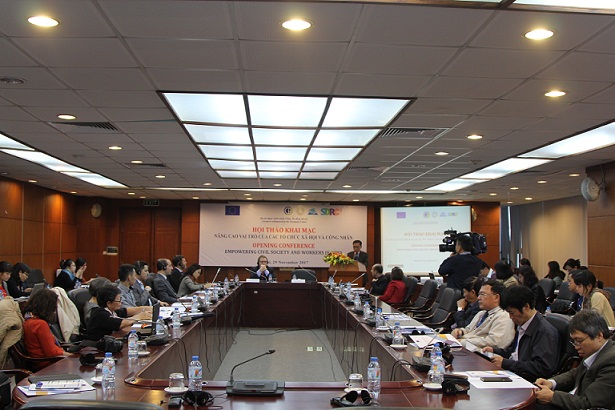Attending the workshop were Mr. Tom Corrie, Deputy Director of Development, Counselor Delegation of the European Union to Vietnam; Mr. Antonio Adrian Garcia, Vice Ambassador, Mexican Embassy in vietnam; Mr. Etienne Rolland Piegue, Counselor for Cultural and Cooperative Affairs, French Embassy in Vietnam Assoc.Prof.Dr. Nguyen An Ha, Project Coordinator, Director of the European Research Institute; Dr. Do Ta Khanh, Project Director, European Research Institute and representatives from international organizations, social organizations, universities and research institutions inside and outside the Academy.
 |
 |
Vietnam is strongly integrating into the regional and world economy through the signing of free trade agreements, including the free trade agreement between Vietnam and the European Union (EVFTA). Integration has led to large inflows of foreign investment into Vietnam as well as strong growth of domestic firms. The structure of the economy has shifted dramatically from agriculture to industry and services, along with that shift is labor moverment. A large part of rural labor has migrated to industrial development areas in urban and near-urban areas.
Many research have been conducted, including studies by the European Institute for Research show that migration of workers isn't sustainable. In addition, while working, majority of workers are facing many difficulties in working and living conditions. Vietnam's Trade Union is the official representative organization for laborers has practiced many practical activities to represent and care for the material and spiritual life of laborers. However, due to the rapid growth of the labor market, Vietnam's Trade Union has not covered the edge of life of workers.
 |
 |
At the seminar, Assoc.Prof.Dr. Nguyen An Ha on behalf of the leaders of the European Research Institute warmly welcomed attendance of the participants and emphasized the importance of social organizations in supporting workers, contributing to the activities of the Unions. Besides, the involvement of labor-related social organizations has also contributed to overseeing the implementation of free trade agreements that Vietnam has signed with partners, including the Free Trade Agreement between Vietnam and the EU.
Mr. Nguyen An Ha appreciated the diplomatic relationship between Vietnam and EU in the past 20 years and expressed gratitude for valuable support to the Institute's research activities and the development of the social sciences in Vietnam. Director of Institute believed in experience and close cooperation between partners, the project "Enhancing the role of social organizations and workers" will achieve good results.

Representative of the European Union - the donor of the project, delivered a speech at the symposium, Mr. Tom Corrie summarized the main features of the diplomatic relationship between the EU and Vietnam; emphasized that the Free Trade Agreement would open up trade opportunities for both sides including important content on sustainable development, management and labor rights. Mr. Tom Corrie affirmed the key role of European and Vietnamese civil society in providing an overview of the relationship between trade and sustainable development; he also acknowledged and appreciated the efforts of the European Research Institute during the project implementation as well as continuing to cooperate with the Institute to carry out these projects in the coming years.
At the seminar, Dr. Do Ta Khanh introduced objectives, contents and expected results of project. Through increasing connectivity, research and advocacy; project's aim is to improve internal governance, accountability and legal status of labor-related social organizations. The project was implemented in three economic zones, including the northern economic region, the central economic region and the southern economic zone, corresponding to three industrialized sectors, namely Hanoi, Da Nang and Ho Chi Minh City. The results of the project would be disseminated at both central and local levels, through policy discussions and workshops organized by the project.
The workshop was divided into 2 sessions, focusing on two main topics: (1) Background, objectives and activities of the project, especially the selection of social organizations related to labor and the effective of the project approach to policy advocacy; (2) Impacts of industrialization and industrial development strategy on workers in Viet Nam and status of social organizations related to labor in Ho Chi Minh city.
The seminar is a useful forum for scientists, representatives of international organizations and social organizations in Vietnam. Comments at the workshop will encourage many ideas and create incentives for the labor force in the industrial sector; it also has important implications for research in the social sciences, contributing to country's development paths in order to establish a network for joint working, research and action among partners. Thereby contributing to the development of Vietnam and the relationship between Vietnam and the EU in the coming time.
Nguyen Thu Trang







